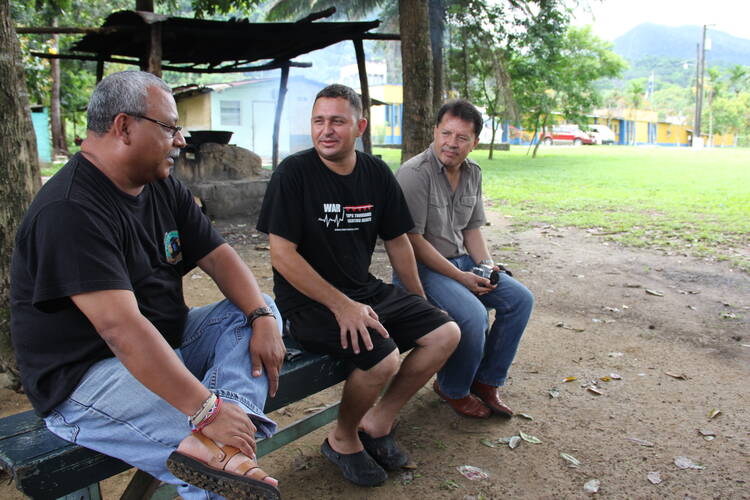The setting was informal: Ismael Moreno Coto, S.J., known as “Padre Melo,” wore shorts and sandals and sat on a couch in the living room of his Jesuit community. Surrounded by friends, coworkers and visitors from two U.S. delegations, he spoke into his laptop computer. Yet the impact was undeniable: Padre Melo was broadcasting his nightly radio program, “America Libre”; his voice and message were reaching 1.5 million Hondurans through the airwaves of Radio Progreso, a Jesuit-sponsored communications apostolate.
During this broadcast, Padre Melo told the story Inti-Illimani, a Chilean folk music group who were essentially exiled from their country and whose music was banned under the military rule of Augusto Pinochet. He interviewed Rafael García, S.J., a member of a visiting delegation (of which I also took part) and pastor of Immaculate Conception Parish in Albuquerque, N.M. Padre Melo urged community members to attend the march, Mass and celebration of the life of Jim (Padre Guadalupe) Carney, S.J, which I wrote about here. To the untrained eye, Padre Melo might have been simply enjoying food and kinship with the diverse group gathered in his home. But, in fact, this evening broadcast captured Padre Melo’s unique brand of pastoral care that he seemingly offers to every person he encounters.
Padre Melo is the director of ERIC (Equipo de Reflexión, Investigación y Comunicación), a social analysis and action center, and the aforementioned Radio Progreso. But these responsibilities do not keep him from building relationships with and offering support to a wide range of members of Honduran society. As quick with a quip or an affectionate pat on the back, Padre Melo’s pastoral ministry has helped him develop relationships with a far-reaching and varied cross section of people that at once keep him grounded in the struggles of people but also connected to leaders in Honduran society. During the delegation I experienced the work of Padre Melo in many different capacities and settings. Here are some examples:
- Padre Melo celebrates Mass on Sunday evenings in a small chapel in El Progreso with a congregation comprised of talented young adult musicians, elderly community residents, devout young women and experienced community organizers.
- In the capital city of Tegucigalpa, at the most prestigious university in the country, Padre Melo participated in a panel that marked the beginning of a formal relationship between ERIC and the university, and he also tenderly offered support and prayers to Julieta Castellanos, the university president whose son was kidnapped and murdered by police.
- At a prison farm outside of La Ceiba, Padre Melo’s friendship with Chabelo Morales has helped inspire a legal challenge to Morales’s wrongful arrest, trial and sentencing. International attention and pressure, aided by Padre Melo, has helped bring the case up for reconsideration. Also, Padre Melo’s rapport with the guards and prison director has helped protect Chabelo from violence inside the prison.
- Padre Melo’s longtime friendship with the president of Honduras’ largest union has refined the integration of worker’s rights into Padre Melo’s social analysis, even while he extends warmth and companionship to the leader who has recently struggled with health concerns.
- Padre Melo’s relationships with movement leaders has helped build a network among individuals and communities resisting intimidation from mine companies to vacate their land, pushing back against land seizure by a sugar company, and organizing resistance to violence against women.
Honduras is in dire need of strong civil society groups and organizations to counteract political and police corruption, rampant gang and drug trafficking violence, and subversion of laws and judicial systems to the interests of wealthy and powerful individuals and companies. By offering far-reaching and inclusive pastoral care to a wide range of communities, Padre Melo is sowing the seeds to grow a community of committed people capable of transforming what is often a fragmented and polarized country.
Nicholas Napolitano is provincial assistant for social ministries for the Maryland, New England and New York Provinces of the Society of Jesus.
Additional coverage of Honduras from ‘America’
Sin and Grace in Honduras, Rafael García, S.J. (Oct. 22)
Celebrating the Life of Padre Guadalupe, Nicholas Napolitano (Oct. 21)
A Dark Night in Honduras, Luke Hansen, S.J. (Sept. 13)
Report from Honduras, Luke Hansen, S.J. (Sept. 12)
Photo album from the delegation to Honduras (Sept. 8-15)








